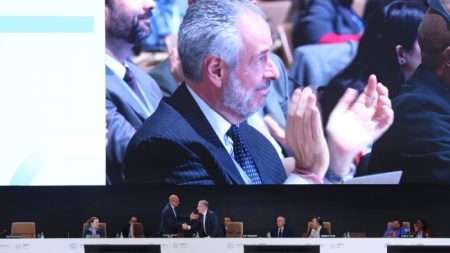Stay informed with free updates
Simply sign up to the Russian business & finance myFT Digest — delivered directly to your inbox.
Russia’s largest state-owned lender Sberbank recorded the highest profit in its history last year thanks to a surge in lending, underlining the recovery of the country’s financial sector from the first wave of western sanctions related to Vladimir Putin’s full scale invasion of Ukraine.
The Moscow-based lender increased profits more than fivefold to Rbs1.5tn ($16.3bn) in 2023, accounting for almost half of the Rbs3.3tn aggregate profits the country’s banks generated.
Isolated from the world’s capital markets, Russian banks have benefited from a boom in domestic lending as households have rushed to take on state-subsidised mortgages and corporate lending has soared.
The record profits are another sign of the relative resilience of the Russian economy despite US and European efforts to hurt it via trade restrictions and other punitive measures.
Herman Gref, the bank’s chief executive and a longtime ally of Vladimir Putin, said the bank would pay out half of its profits as dividends. In the previous year, it paid out dividends amounting to twice its profits, boosting Russian state coffers to fund the war that Putin’s regime is waging on Ukraine. Russia holds a majority stake in the lender.
“Of course, every shareholder would like the company to pay 110 per cent as dividends, and we can afford it — but not for long . . . Our task is to develop the company. Fifty per cent today is the threshold that we can maintain in the medium term, I hope” Gref said on Wednesday.
The Sberbank CEO added that he was optimistic about 2024: “This year, we expect a better financial outcome than last year, which was record-breaking”.
Sberbank’s net interest income climbed almost 40 per cent in 2023, driven by growth in its mortgage and corporate loan portfolios, which increased by around 35 and 25 per cent respectively.
The increase reflects broader growth of the country’s mortgage market. Central bank figures published this month show the total mortgage portfolio of Russian banks increased by 34.5 per cent last year. The volumes of outstanding loans had grown by 20 per cent the previous year.
Government-subsidised loan programmes have allowed Russians to buy new-build apartments at half the interest rate set by the central bank. More than 60 per cent of the loans granted by Russian banks in 2023 were subsidised.
The Central Bank has lobbied against the extension of most of these programs because they drive up property prices and exacerbate inequality.
Elena Tsareva, the BCS Global Markets senior analyst, said Sberbank’s profit was fuelled not only by its market share — it has a quasi-monopoly status with about half of Russian retail deposits — but also by “sound risk and capital management.”
Read the full article here















